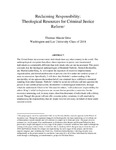Reclaiming Responsibility: Theological Resources for Criminal Justice Reform (thesis)

View/
Author
Grist, Thomas M.
Subject
Washington and Lee University -- Honors in Religion
Imprisonment
Stigma (Social psychology)
United States
Niebuhr, Reinhold, 1892-1971
Bonhoeffer, Dietrich, 1906-1945
King, Martin Luther, Jr., 1929-1968
Metadata
Show full item recordDescription
Thesis; [FULL-TEXT FREELY AVAILABLE ONLINE] Thomas M. Grist is a member of the Class of 2018 of Washington and Lee University. The United States incarcerates more individuals than any other country in the world. The anthropological viewpoint that allows these injustices to persist sees incarcerated individuals as existentially different than individuals who are not incarcerated. This paper contends that the theological anthropologies of Reinhold Niebuhr, Dietrich Bonhoeffer, and Martin Luther King, Jr. will expose the injustices of excessive imprisonment, stigmatization, and disenfranchisement of persons who live under the modern system of mass incarceration. Specifically, I will show that Niebuhr's understanding of the inevitability of sin opposes the modern belief that criminals have a different existential standing from other humans. Niebuhr's belief in social sin will also call into question the justice of our current penal system. Bonhoeffer's Christological framework, through which he understands Christ to be “the man for others,” will underscore responsibility for others. King's belief in forgiveness and reconciliation provides a corrective for the excessive sentencing and, in many states, disenfranchisement of individuals with a felony record. Though this paper will not offer concrete policy solutions, it will conclude by emphasizing the responsibility that all people have for advocacy on behalf of those under carceral control.